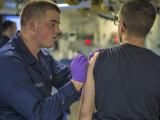Mar 27, 2003 (CIDRAP News) – In its second report on the civilian smallpox vaccination program, the Institute of Medicine (IOM) urges the government to proceed cautiously and advises public health agencies to focus on coordination, not just numbers of people vaccinated.
The Centers for Disease Control and Prevention (CDC) "should continue to make every effort to evaluate the progress and safety of the campaign, even without an official break between the separate phases of the campaign," states an IOM news release on the report by the Committee on Smallpox Vaccine Program Implementation.
CDC asked the IOM last fall for its ongoing advice on the vaccination program. In its first report, in mid-January, the committee advised the CDC to pause for a safety evaluation after the first round of vaccinations, targeting health workers volunteering to serve on smallpox response teams. However, CDC signaled early in March that states could proceed to stage 2—vaccinating other healthcare workers along with emergency responders—before completing the first stage.
Committee Chairman Brian Strom, MD, MPH, said today that the program is moving into the second stage faster than was originally expected. "However, this does not mean that an evaluation should not be conducted," he said. "On the contrary, it makes an evaluation even more critical, to determine what lessons can be learned from phase I, as we enter phase II."
Strom called for an evaluation of the whole program and its various components, adding, "Additional evaluations should examine in detail patient outcomes, shedding light on the incidence of adverse effects, and their risk factors." He praised the CDC for quickly developing an active surveillance system.
The new reports of possible associations between smallpox vaccine and heart problems, including myocarditis, heart attacks, and angina, show the importance of careful safety studies, including the use of a comparison group to assess the rate of health problems that would have occurred naturally, Strom said.
Strom also urged health officials not to focus solely on how many people have been vaccinated. "While it is necessary to have a sufficient number of vaccinated personnel to respond to a smallpox attack, numbers alone do not constitute preparedness," he said. It's also important, he asserted, to know the locations and capabilities of smallpox response teams and to ensure that all state and community partners are coordinating their work.
The report also urges CDC to keep a close eye on the costs of the program and its effects on the ability of state and local health departments to provide other public health services, according to the news release.
The committee also noted that the lack of a compensation program for vaccinees who incur losses because of adverse reactions has hindered the vaccination effort. If CDC determines that response teams are not fully prepared, it should "document the extent to which lack of compensation was a reason that vaccine candidates declined inoculation," the news release states.
See also:
IOM news release with link to full report
http://www8.nationalacademies.org/onpinews/newsitem.aspx?RecordID=NI000498





















